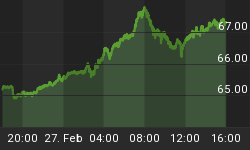Here is the question of the day: Are drone, workerless ocean freight transport ships coming?
If shippers can pull it off, the cost saving would be immense. But what about the job losses? Insurance? Inflation?
Let's explore the questions with a look at the Bloomberg article Rolls-Royce Drone Ships Challenge $375 Billion Industry.
In an age of aerial drones and driver-less cars, Rolls-Royce (RR/) Holdings Plc is designing unmanned cargo ships.
Rolls-Royce's Blue Ocean development team has set up a virtual-reality prototype at its office in Alesund, Norway, that simulates 360-degree views from a vessel's bridge. Eventually, the London-based manufacturer of engines and turbines says, captains on dry land will use similar control centers to command hundreds of crewless ships.
Drone ships would be safer, cheaper and less polluting for the $375 billion shipping industry that carries 90 percent of world trade, Rolls-Royce says.
The European Union is funding a 3.5 million-euro ($4.8 million) study called the Maritime Unmanned Navigation through Intelligence in Networks project. The researchers are preparing the prototype for simulated sea trials to assess the costs and benefits, which will finish next year, said Hans-Christoph Burmeister at the Fraunhofer Center for Maritime Logistics and Services CML in Hamburg.
Even so, maritime companies, insurers, engineers, labor unions and regulators doubt unmanned ships could be safe and cost-effective any time soon.
Crew costs of $3,299 a day account for about 44 percent of total operating expenses for a large container ship, according to Moore Stephens LLP, an industry accountant and consultant.
The potential savings don't justify the investments that would be needed to make unmanned ships safe, said Tor Svensen, chief executive officer of maritime for DNV GL, the largest company certifying vessels for safety standards.
While each company can develop its own standards, the 12-member International Association of Classification Societies in London hasn't developed unified guidelines for unmanned ships, Secretary Derek Hodgson said.
"Can you imagine what it would be like with an unmanned vessel with cargo on board trading on the open seas? You get in enough trouble with crew on board," Hodgson said by phone Jan. 7. "There are an enormous number of hoops for it to go through before it even got onto the drawing board."
100% Guaranteed to Happen
Anyone who does not think drone, workerless ships will happen, cannot think clearly.
Skeptics did not think the auto would replace horses or trains. Skeptics thought flight was impossible. Even simple constructs we now take for granted such as coffee on airplanes was once considered ridiculous.
So yes, driverless cars and workerless ocean ships are 100% guaranteed. The only question is "what timeframe?"
I do not have an answer to that question, but let's not bury our heads in the sand over what is inevitable.
Furthermore, it's likely workerless ships arrive before driverless trucks hit mainstream.
After all, the ocean is a vast place and there are no road or other constraints except in docking. If landing is a major concern, how difficult would it be to helicopter in crews specifically for the final landing?
What About Jobs?
Let's get a grip on the problem of jobs. Yes, many will vanish. But others will appear. I cannot name one technological advancement in history that did not ultimately create more jobs than it destroyed.
Examples
- Lightbulbs replaced candles
- Cars replaced horses
- Trains replaced the Pony Express
- Personal computers
- Internet replacing libraries
Can someone tell me why it's supposed to be different this time?
What About Inflation?
Therein lay the problem. Driverless cars, the internet, and other price-deflationary advances have outstripped central banks ability to inflate prices and wages.
Try as they might, central banks have only managed to foster asset bubbles (they don't even see) not the 2% price inflation they want.
Yet they keep trying. Prices went up but not as much as central banks want. Wages rose less than prices, especially for those on the bottom end. Home prices soared so Congress initiated countless affordable home programs. Then home prices crashed and Congress and the Fed acted to prop up home prices.
No one really wanted affordable homes, they just wanted ill-advised affordable home programs. Now people scream about income inequality and for higher minimum wages.
This all stems from one bad idea - central banks fostering inflation.
One Bad Idea Leads to Another, and Another
In the effort to produce 2% inflation, One Bad Idea Leads to Another, and Another
That construct is corollary number six of the greater "Law of Bad Ideas".
Can the Fed Prevent Boom-Bust Cycles?
Heck no, the Fed causes them! For details, see Bubblicious Questions: What Causes Economic Bubbles? When Do Bubbles Burst? Can the Fed Prevent Bubbles?
Also consider Deflation Theory Reality Check.
Losing Battle
Such are the challenges the Fed faces, and they are losing the battle because the advancement of technology is inherently price-deflationary. Technollogy has overtaken the Fed's (central bankers in general) ability to inflate consumer prices.
Here's the irony: Ridiculous efforts to prevent price-deflation cause asset bubbles that inevitably collapse, which in turn bring the very conditions central banks wish to prevent.















